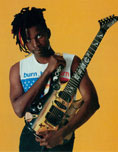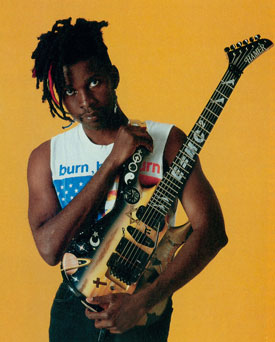Born to Burn: Vernon Reid


Born to Burn: Why I Play Guitar Originally printed in Guitar World, October 1992 Vernon Reid “As you grow, you begin to think: What got me to this point? What made me do all this? I always felt out of place, and my sense of being an outsider was much more fundamental than being an outsider because I was black. I was born in England, and was brought to America as a baby — and that alone was very odd because I never had any identification with Europe. I was always the odd-child out, always having odd ideas and being different from everyone else. There’s this one story about how, when I was in kindergarten, all the kids were asked to draw a house that they either lived in or would like to live in — and I drew a rocket ship. “On one level, I’m a person who likes to be around other people. I’m very gregarious — I’m not a misanthrope. But, at the same time, I sometimes have a feeling of awkwardness or of not belonging. Those two things tend to conflict, and I don’t think any level of success will ever turn that around. I don’t think I’ll ever really feel like an ‘in’ person. “Music — or any form of art — is really just an expression of the inexpressible. You can talk a blue streak about what it all means, but when someone can play a series of notes and accomplishes the same thing — that’s something magical. When you can feel something without having anyone tell you — that’s what magic is to me. It’s really astounding, because it’s something that’s above and beyond technique — it’s the way people apply it, the conviction with which they play, and the way they put the tones together. The great thing about it is that you could have someone with great technique take you there, or you could have someone with no technique take you to the same place. “For me, getting to this magical place — it’s me, but it’s not me. You can be extremely conscious about what you are doing, because aside from the feeling, guitar is also a science and a matter of mathematics. You can be very aware of the relationship between melody, chords and scales. But I just think there is this other magical thing where something just happens. The worst thing is when you want something to happen. I think that’s important — but you have to go above and beyond that. That’s not to say play over your audience’s heads or have an intellectual attitude about music, but I think you have to be ready to go to this magical place where the unexpected will happen. “I don’t write songs thinking, I must tell the people this or that. Part of what I’m thinking about is much deeper than the problem of being black — going back to that outsider vibe — but even deeper than that. There would have to be a real fundamental, bone-deep change in the American psyche for that to change and that would probably have repercussions in terms of class and human relations. Part of it is just asking yourself questions like, ‘Why are we here?’ and ‘Why do we keep making the same mistakes?’ “You could live your life lying to people, and to yourself, and telling people things they really want to hear. Or you could live your life just being honest. The thing that perpetuates a lot of our problems is the near or complete lack of honesty within society. In terms of being an artist, that’s as true as anything else. For instance, if you can paint with photographic realism, generally people will say you are very good. But what if you really want to just put slashes and dots on the canvas — what if that’s what you really feel? There’s a real danger in that. Say you really have a Jackson Pollock side of you that’s screaming to get out, but yet you have a technique that allows you to do things so people will applaud you. The point is that you’ll probably never do the painting that you really wanted to do. It’s the fear of rejection and most people are not thick-skinned enough to deal with that. “Whatever you’re playing around with — musically or lyrically — you have to bank on the chance that someone will understand you. Someone will be able to hear what’s really happening. Living Colour has a lot of different interests and we put all of them on our records. Unfortunately, sometimes people latch onto one thing they don’t like and use that as an excuse not to listen to the totality of what’s being said. “A lot of people in rock pride them themselves on their ‘wild’ image, yet in many ways they’re extremely conservative. There are all these concrete rules: You look a certain way, you dress a certain way, you play a certain way and you have a certain kind of rack. Rock and roll is considered to be outside of society, but to a large degree, that’s window dressing. A lot of the attitudes in rock are really no different from the attitudes you hear everywhere. And a lot of times it’s not as open and accepting as you might think.”
Get The Pick Newsletter
All the latest guitar news, interviews, lessons, reviews, deals and more, direct to your inbox!


![[from left] George Harrison with his Gretsch Country Gentleman, Norman Harris of Norman's Rare Guitars holds a gold-top Les Paul, John Fogerty with his legendary 1969 Rickenbacker](https://cdn.mos.cms.futurecdn.net/TuH3nuhn9etqjdn5sy4ntW.jpg)







